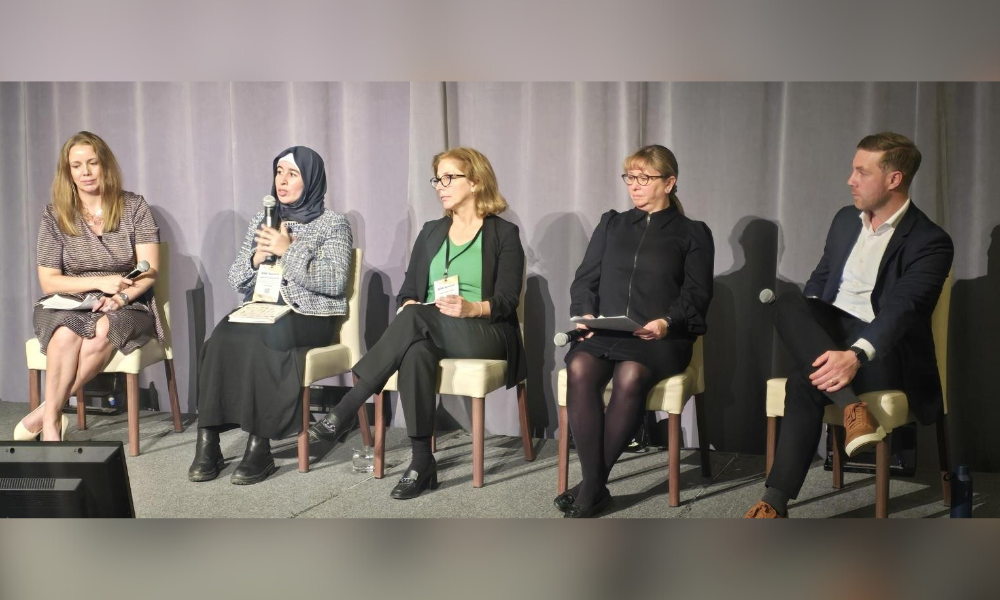
At the ESG Summit, panellists spoke about regulating, standardizing and complying with ESG standards

With the shift from voluntary to mandatory ESG reporting requirements in Canada, expectations have reached unprecedented levels, a panel of experts recently highlighted yesterday at Canadian Lawyer’s ESG Summit in Toronto.
“We're entering into this stage or period of mandatory reporting requirements. And with that comes increased expectations on rigour, robustness, and the overall quality of reporting,” said panel moderator Scott Morrison, a sustainability reporting & assurance partner at PwC.
Morrison’s panel examined the future of sustainability standards and the legal implications of mandatory reporting. It also included Heather Lang of the International Sustainability Standards Board (ISSB), Jo-Anne Matear from the Ontario Securities Commission, Meryem Baskoun at Air Canada and Kealey Martin at Fortis Inc.
Morrison opened the panel by highlighting the complex global landscape for Canadian businesses. “We talked so many years about the alphabet soup of ESG standards and frameworks and confusion and [complexity] that brought. I think today, you could probably argue it's more complex than it's ever been, especially for large global organizations dealing with multiple jurisdictional regulations.”
Heather Lang explained that the ISSB’s standards were developed as a global baseline to provide information that's material to investors. "There's been a tremendous amount of engagement with jurisdictions and other stakeholders to deliver that," she said, noting that most recently countries such as Australia, Singapore, and Hong Kong are in the process of adopting ISSB standards. Lang says the goal was to be adaptable: "Adding those building blocks is welcome… for example, in regional contexts like here in Canada, focusing on Indigenous rights," she said.
Lang also discussed the ISSB's current research focus areas, which include biodiversity and human capital. As the global push for sustainability grows, these areas are increasingly important, especially in Canada, where ecosystem impact and Indigenous rights intersect. She stressed the need for proportionality mechanisms and transition relief to ensure companies can comply with new standards without disproportionate costs. “The jurisdictions decide which companies have to apply the standards… but [we’ve] been laser-focused on the implementation and adoption of those of standards, and that's been a tremendous amount of education and capacity building.”
Air Canada’s Meryem Baskoun underscored the value of flexibility, explaining that stakeholder engagement is crucial as the company works to integrate new frameworks without duplicating existing practices. "We don’t have to reinvent the wheel… A lot of companies are already doing so much [and] have established … reporting processes," she said. Baskoun emphasized that conversations with investors often reveal a mix of optimism and skepticism, noting that the reality of ESG reporting requires tough discussions, but the frameworks can help provide homogeneity within the company. Baskoun also highlighted the importance of interoperability between standards, which is challenging for her team to navigate as they work on reporting different standards. “The ISSB is making a lot of efforts to look into that, and that's very helpful.”
In terms of how Fortis Inc. addresses these evolving standards, Kealey Martin highlighted the challenge of preparing credible climate scenario analyses and tackling scope 3, or indirect value chain, emissions data, given Fortis’ extensive operations across North America. "No one is expecting perfection," Martin says, adding that the priority has been “turning the dial, showing progress.” With investor scrutiny mounting, the company has had to consider localized climate risks, particularly in wildfire-prone British Columbia and Alberta.
Jo-Anne Matear from the OSC offered a regulatory perspective, affirming that investor demand is driving the need for better disclosures. She reminded the audience that the OSC’s role is "working within our mandate… our focus remains on investors’ informational needs and materiality," noting that Canada’s approach to materiality is based on the “reasonable investor” test, whereas Europe’s double materiality standard considers broader societal and environmental impacts of corporate actions beyond financial effects. For the OSC, the mission is to support capital formation while maintaining the competitiveness of Canadian markets.
Despite Canada's caution with mandatory disclosure laws, Matear acknowledged the competitiveness concerns facing Canadian companies. “There are risks if we over-regulate, that issuers may seek to list in other markets, and there’s a risk that if we under-regulate, that may make it more challenging for our issuers to obtain capital, particularly foreign capital," she added, highlighting the delicate balance the OSC is navigating.
Looking ahead, several panellists addressed the trend of integrating ESG data into financial filings, a shift that could require companies to adopt systems capable of handling both financial and non-financial disclosures in tandem. Baskoun of Air Canada noted that this synchronization would be challenging but crucial, saying, "Having to do them at the same time, at some point, is definitely going to be a big challenge for us, for our auditors, our internal teams as well."
The session concluded with panellists sharing strategic insights for companies preparing for mandatory ESG compliance. Lang encouraged businesses to avoid seeking “perfection” right away and instead focus on establishing foundational practices. Matear emphasized that companies should focus on delivering “decision-useful” information to investors, rather than aiming to align with every emerging standard.